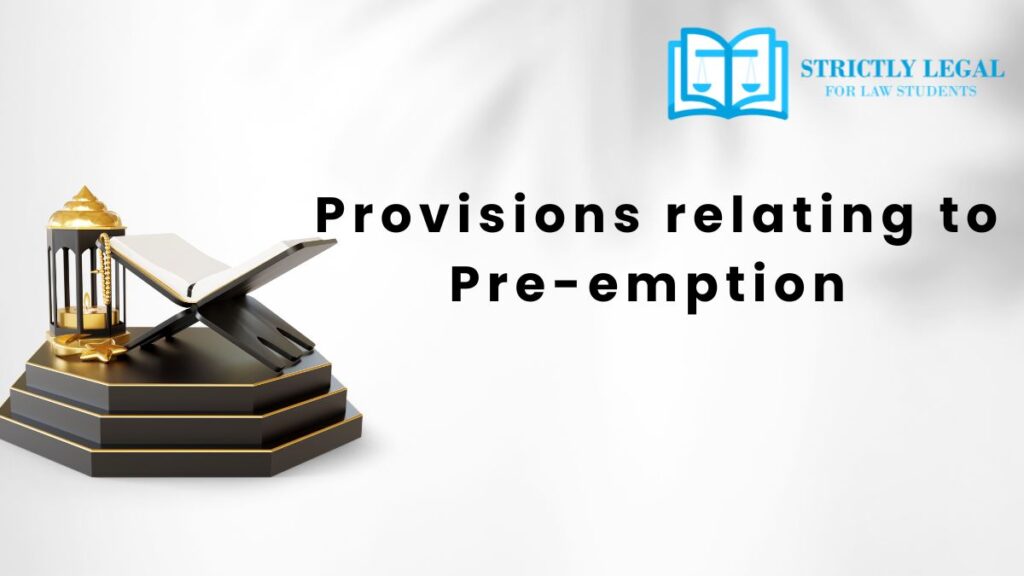The pre-emption law was originated in Prophet Muhammad’s saying. Pre-emption is also known as shufa, which portrays that conjunction that is adjacent. In Govind Dayal v. Inaytullah, Mahmood J. explains pre-emption as “a right which the owner of certain immovable property possesses, as such, for the quiet enjoyment of that immovable property, to obtain, in substitution for the buyer, proprietary possession of certain other immovable property, not his own, on such terms as those on which such latter immovable property is sold to another person.” As per the Hanafi Law, when a property is being sold, there exists a co-sharer, a participant in the amenities and attachments of the property, and a neighbor possessing an abut immovable property. Shia laws encompasses pre-emption to co-owners in the undivided property. Shaf’I law gives recognition to pre-emption only between the co-sharers.
Table of Contents
Parties Involved
Vendor: The person who is the owner of the property and is pleased to sell the property.
Vendee: An alien to the property and is also the one who buys it.
Pre-emptor: The neighbor, co-sharer or heir.
Development through precedents over ages
In the case of Sk. Kudratullah v. Mahini, Honorable Justice Mitter reacted to them in two bunches. At first, if the right of pre-emption subsists before the factual sale of the property? And second, if the property which is subdued to the right of pre-emption is accrued on absolute ownership to the purchaser?
The reaction to both the questions was pessimistic and corroborative respectively by Honorable Justice Mitter and he came to an end by stating that the right to pre-emption is not a thing but a scanty right to repurchase. Post 16 years, the Honorable Allahabad high Court’s case of Gobind Dayal v. Inayatullah, the factual nature of the right of pre-emption was elucidated. It was contended that, first and foremost, it is against the eyes of law to sell a property without preliminarily informing the neighbor. It is upon the discretion of the neighbor for taking to or leaving it. Furthermore, the concept of pre-emption sub exists in all sorts of joint properties and preferential right makes an appearance if the vendor refrains from informing the coparcener or the neighbor. As a consequence, right before actual sales. Sale is not the actual basis of pre-emption.
Supplementally, in the case of Bishal Singh v. Khazan, the Honorable Apex Court made it short and crisp regarding the rules and nature of pre-emption:
- The right of pre-emption is a right to put forward the property for being sold. It is the inherent right or the key right of the adjoining property’s owner. (neighbor)
- It is the amendatory right of the pre-emptor to go around with the property sold.
- This right does not give cognizance for repurchasing; as it is the right of swapping or substitution.
- It is right to obtain and receive the unabridged whole property, not just a section or ounce of it.
- Inclination is the quintessence of this right.
- The right provided is frail and can be vanquished by suitable and significant procedure.
Rights under pre-emption
There are two situations under which the right of pre-emption arises:
In case of sale
The right to allege pre-emption comes to light when the property is conditional to a well founded valid sale. Bare intention to sell a property cannot be a rationale for alleging the right of pre-emption. The sale is exclusive of inheritance, gift, waqf, bequest of a lease in eternity but it is to be kept in mind that the sale is inclusive of exchange. The sale must be authentic, unadulterated and bonafide.
When the sale is complete
Bare intention to sell cannot commence the the right to claim. The right to make a claim makes an appearance when the sale is accomplished or discharged. As per the Muslim law, a sale is taken to be accomplished when the vendee pays to the vendor and the possession of the property is conveyed or dispatched by the vendor. As it may be necessary that the performance of an instrument of sale is as per the Transfer of Property Act 1882. Section 54 of The Transfer of Property Act portrays that, the sale of property of a value of Rs. 100 and up is not accomplished if not made through a registered instrument. In addition to that, the honorable High Court of Patna and Calcutta observed that the right of pre-emption doesn’t make an appearance unless the registration is accomplished as per the Transfer of Property Act.
When right is lost?
The right of pre-emption is lost in the following manner:
- Omission to claim or waiver; or excessive delay in demanding it: When the person authorized for this right, may it be expressed or implied relinquished it or omits to propound his right right away.
- Death of pre-emptor: The right to pre-emption goes away or terminates with the death of pre-emptor, on situations where the pre-emptor passes away before implementing it, under the Hanafi law. Under Shafi’s and Shiite law, the right to pre-empt envoys upon the pre-emptor’s heirs is in accordance to their right of legacy.
- Forfeiture of right: the right of pre-emption is forfeited in the following conditions:
- When it is let gone by the pre-emptor for contemplation.
- Tries to dispose of the content of pre-emption to an alien,
- Partition is made of a property in respect of which the right of pre-emption can only be claimed by coparceners,
- There is some statutory disability with the pre-emptor as regards the purchase of land in question concerned.
Applicability of pre-emption on Hindus
Muslim personal law does not differentiate on the sole basis of caste and creed with respect to the avidness of pre-emption to someone who is not a Muslim. On the other hand, Hindu law also doesn’t furnish any rule in connection with the materiality of pre-emption to the Hindus. It is very certain and straightforward that the law of pre-emption applies to Hindus and they are authorized to exercise the said right.
Difference of religion
The difference arises in the religion of the vendor, vendee and the pre-emptor or the buyer, seller and the pre-emptor. In situations or circumstances where all the parties that are involved are Muslim then there is no place for an issue to come up and the law of pre-emption is solicited. But what if all the parties involved are not belonging to the religion of Muslim? Hence in the circumstances or cases penned down below, the law of pre-emption can’t be applied:
- Where everyone to the parties to pre-emption are Hindus and there is no pertinent custom present.
- The pre-emptor is a Muslim being the vendor and vendee as Hindu.
- The pre-emptor is Hindu, being the vendor and the vendee as Muslim, .
- When the vendor and pre-emptor are Hindu but the vendee is Muslim.
- When the vendor and pre-emptor are Muslim but vendee Hindu.
- Where the vendor is Muslim but the vendee and pre-emptor are Hindu.

Law student.
Turning legal insights into engaging narratives.





